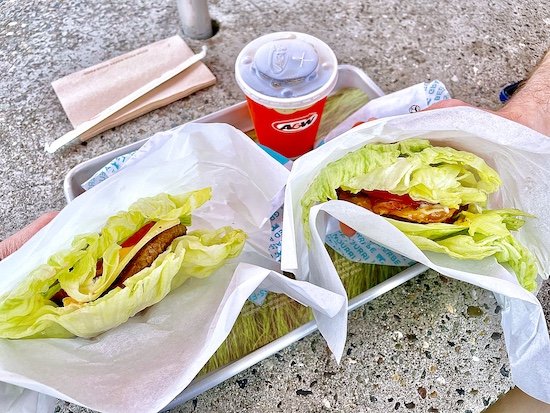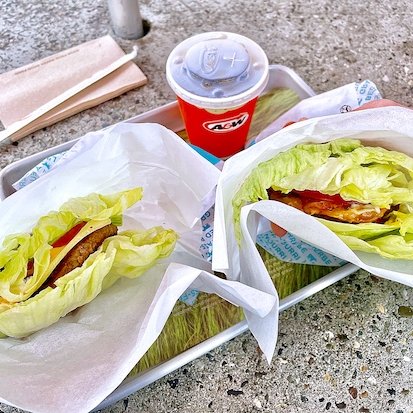
I have been seeing plenty of commercials advertising that the beef in A&W burgers was all grass-fed, or at least it is in Canada. While this piqued my interest, it was still a fast food burger joint. In my experience, while fast food restaurants are usually willing to give you a bunless burger, they would do so by simply removing the bun and serving it up like a salad in a plastic container, which I felt was wasteful, not just for the plastic, but also for the fact that I'm still paying for the bun but getting nothing of value to replace it. Then I read that they actually do proper lettuce-wrapped burgers as an option at A&W, so I decided it was worth trying.
Stepping Up the Meat and Cheese Game
I took a deeper dive into the quality of the meat they use and was happy to find that they not only use grass-fed beef, it is also raised without artificial hormones and steroids. Read more about A&W beef.. The chicken/eggs they use is all raised locally, also raised without the use of antibiotics, and given a fully vegetarian diet. They are also not raised in cramped cages and are given room to roam, with access to fresh air and clean water. On top of that, A&W is the first North American restaurant chain to serve pork that's raised without the use of antibiotics. As for cheese, they have stepped up and got rid of processed cheese from their menu. All their cheese is the real deal and 100% from Canadian dairy farms. It is still cheese from North American cows, which does tend to have more of an impact when it comes to dairy sensitivities, but it's a way better choice than processed cheese.
Teen & Mozza Bunless Burgers Broken Down
Chris and I decided to order two different burgers, the teen and the mozzarella burgers to see how they fared without the bun. The mozza burger is similar to a McDonald's Big Mac in terms of the "mozza sauce" and flavour profile but with bacon and using mozzarella as the cheese. The teen burger is a little more like a standard burger with onions, tomato and pickles, along with ketchup, mustard and "teen sauce" as the sauces. The mayo based sauces are all made from unhealthy vegetable oils like soy or canola, but if you want to take those out of the equation, it's simply a matter of asking for no sauce. I like the way they wrapped the burgers in the lettuce. The burgers came in an outer envelope with a secondary paper wrapping inside to help keep the burger together. It was far less messy than other lettuce wrapped burgers I've had in the past. It was still a little messier than a bun would be, but that's to be expected.
The burgers are not super cheap, over $6.69 each, but I am not at all surprised considering the ingredients. A Big Mac or a quarter pounder at McDonald's is $5.69, but it's definitely not grass-fed, and the cheese is processed. For a dollar more, I'll take the burgers with the better ingredients, thank you very much.
A&W Diet Root Beer to Wash It All Down
I would love to say that the diet A&W holds similarly high quality ingredients, but sadly it does contain aspartame. We got it anyway, and it does taste pretty good, far better than the cloyingly sweet sugar-based version. It is not burdened with the chemically taste I associate with aspartame. That being said, I definitely wouldn't drink it regularly. I would love to see a stevia sweetened version one day. This is the dream, because I do like me a good root beer.
Overall Impressions
I'm happy to see a fast food chain committed to using higher quality local ingredients that are better for our health, the welfare of the animals, and for the planet. I'm also happy that they are packaging and advertising keto/paleo friendly options purposefully and not just offering them on request. I will definitely look to them whenever I need a fast food burger option, over other options that are out there, and hope that their example encourages other fast food chains to step up their game.
(*Note: This review of A&W and its food quality only applies to A&W restaurants in Canada. Unfortunately, it's American counterpart does not have the same commitment to food quality, so don't expect the same standards in the States.)




